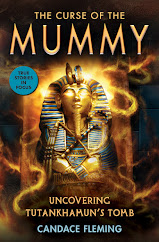Author: Candace Fleming
Publisher: Scholastic Focus
Pages: 304
Review copy: ARC via author
Availability: September 7, 2021
Summary: Candace Fleming presents the edge-of-your-seat true story of the search for Tutankhamun's tomb, the Western public's belief that the dig was cursed, and the battle for ownership of the treasures within.
During the reign of the New Kingdom of Egypt, the boy pharaoh Tutankhamun ruled and died tragically young. In order to send him on his way into the afterlife, his tomb was filled with every treasure he would need after death. And then, it was lost to time, buried in the sands of the Valley of the Kings.
His tomb was also said to be cursed.
Centuries later, as Egypt-mania gripped Europe, two Brits—a rich earl with a habit for gambling and a disreputable, determined archeologist—worked for years to rediscover and open Tutankhamun's tomb. But once it was uncovered, would ancient powers take their revenge for disturbing and even looting the pharaoh's resting place? What else could explain the mysterious illnesses, accidents, and deaths that began once it was found?
My thoughts: Narrative nonfiction is probably my favorite and I started reading it in Junior High. Fiction had my heart, but when I read an awesome novel and wanted to learn more about a related topic, narrative nonfiction was my go-to for information. Even diehard fiction lovers can appreciate The Curse of the Mummy because it reads like a novel. Fleming has crafted an intriguing and thought-provoking story that carries a ton of information and questions about this king.
The chapters are interspersed with brief commentary about rumors surrounding the curse. These tidbits are on black pages so it is easy to distinguished the rumors from the actual facts. She uses the phrase fake news at least once so readers can draw parallels to the current day.
This is mostly a chronological narrative, but it doesn't just tell the individual actions and happenings that occurred around the site of the tomb, but some of the things that led to British people digging up the artifacts of Egypt and even taking some of them out of the country. She asks questions and provides the background for readers to consider colonialism and some of its affects. Readers will also likely be questioning if it is a good thing to disturb the tomb a teenager who would never have envisioned how his body would be taken apart, studied, and put on display for so many people.
It's a book about a particular set of circumstances, but it is a book that is meant to inspire curiosity and model questioning the processes and ways in which we move through the world.
Recommendation: This is a significant book that would be an awesome addition to any library or classroom serving middle grade readers. I believe it will work best with readers on the higher end of middle grade, but it would also be an incredible read aloud with those on the younger end. There is much to discuss and many parallels to be drawn between current events. I immediately thought of the museum scene in Black Panther and so many of the Indigenous nations here in what is currently known as the United States that are working toward repatriation of remains and artifacts. Fleming respects her readers so she does not overly simplify the content and while it is a challenging book, it is well worth the read.
**Update: There are also Indigenous archeologists at work that it would be great to learn about or connect with around this book, like Marvin Defoe the Tribal Historic Preservation Officer for the Red Cliff Band of Lake Superior Chippewa. You may listen to a podcast about the work he is part of at Frog Bay or read the transcript.
Extras:
Short book talk by the author
Longer video from SLJ Day of Dialog including her writing process & about her goals with the text

No comments:
Post a Comment